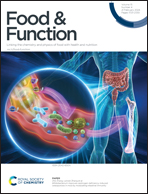Lactobacillus plantarum 24-7 improves postoperative bloating and hard stools by modulating intestinal microbiota in patients with congenital heart disease: a randomized controlled trial†
Abstract
Gastrointestinal symptoms are a common postoperative complication in patients with congenital heart disease (CHD), affecting their postoperative recovery. Probiotic intervention may be a promising therapeutic approach to alleviate postoperative gastrointestinal symptoms. This study aimed to evaluate the potential of Lactobacillus plantarum 24-7 (L. plantarum 24-7) in mitigating postoperative gastrointestinal symptoms and promoting patient recovery. Adult CHD patients scheduled for surgical intervention were recruited. One hundred and twenty patients were randomized and received L. plantarum or placebo intervention twice daily for ten days. Gastrointestinal symptoms were assessed utilizing the Gastrointestinal Symptom Rating Scale (GSRS). Various postoperative variables were analyzed across both groups. Alterations in gut microbiota were evaluated through 16S rRNA sequencing. 112 patients completed the study, with 55 in the probiotic group and 57 in the placebo group. While the disparity in overall postoperative GSRS scores between the two groups did not reach statistical significance (P = 0.067), marked differences were observed in bloating (P = 0.004) and hard stool (P = 0.030) scores. Furthermore, individuals within the probiotic group exhibited lower postoperative neutrophil counts (P = 0.007) and concurrently higher lymphocyte counts (P = 0.001). Variations in the diversity and composition of postoperative gut microbiota were discerned between the probiotic and placebo groups. Remarkably, no probiotic-related adverse events were documented. Supplementation with L. plantarum was well-tolerated and demonstrated partial efficacy in ameliorating gastrointestinal symptoms in postoperative CHD patients. Modulating the gut microbiota may be a potential mechanism by which L. plantarum exerts clinical benefits.



 Please wait while we load your content...
Please wait while we load your content...